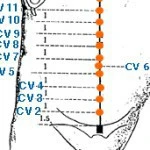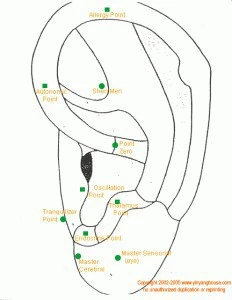Acupuncture with Metformin for Diabetes and Obesity Better Than Metformin Alone (Study)
 According to the World Health Organization the global rates of diabetes have risen in the last 30 years by approximately 300 million cases. Currently there are over 400 million cases of type II diabetes globally. People who are clinically obese, a strong contributing factor to type II diabetes, now includes roughly 1/3 of the global population. In the US alone the medical and loss of productivity costs due to type II diabetes is over $300 billion dollars.
According to the World Health Organization the global rates of diabetes have risen in the last 30 years by approximately 300 million cases. Currently there are over 400 million cases of type II diabetes globally. People who are clinically obese, a strong contributing factor to type II diabetes, now includes roughly 1/3 of the global population. In the US alone the medical and loss of productivity costs due to type II diabetes is over $300 billion dollars.
What becomes of paramount importance, then, is tackling obesity and type II diabetes worldwide. For many people, even with apparent genetic histories, consistent and appropriate diet and lifestyle change will control and/or resolve these issues. But it is not particularly easy for many as they do not get appropriate help and often are held back from making appropriate changes through various mechanisms, some socioeconomic, some political, some by an over reliance of medication that in some ways allows them to sidestep the changes that are truly required.
Chinese Medicine, including acupuncture, Chinese herbal medicine and other aspects, has long been used to treat both the underlying factors and the symptoms of type II diabetes as well as the causal factors of obesity. But there are certainly cases where a combination approach of western and eastern medicine can be the best option. This may be particularly so in patients with sugar that has been hard to control even with appropriate dietary and lifestyle changes and/or in patients who can not as of yet make appropriate changes for any number of viable reasons.
The study I'm going to discuss today looked at the clinical efficacy of a common combination approach. Researchers from the Nanjing University of Chinese Medicine conducted a study that looked at the effects of acupuncture with metformin, a very commonly used western medication for type II diabetes, vs. metformin alone.
While standard acupuncture protocols are essentially never the proper way to treat within Chinese Medicine (see "What Does Acupuncture Treat?" for more on pattern diagnosis), they are valuable in some ways to add consistency to studies like this. In true clinical practice, the treatments would be properly tailored to each individual which by most accounts leads to far more consistent results. Some of the basic protocols and approaches are found on our acupuncture for diabetes page.
The patients in the acupuncture with metformin group were treated every other day for 3 weeks for a total of 10 treatments. The participants were treated with both electro-acupuncture on body points and a selection of auricular (ear) points. The points used were as follows:
 Body Points - (* = with Electro-Acupuncture)
Body Points - (* = with Electro-Acupuncture)- CV 6* - Found 1.5 cun (what is a cun?) below the umbilicus, one of the more important points for qi deficiency signs in the body as well as many stomach and/or spleen disorders from a Chinese Medicine perspective.
- CV 9 - Found 1 cun above the umbilicus, generally useful for water metabolism issues in the body (swelling, edema, etc.). A commonly used point within many weight loss prescriptions.
- CV 12* - 4 cun above the umbilicus, one of the more important abdominal points for an entire range of stomach/spleen disorders from a TCM perspective.
- SP 15* - 4 cun lateral to the umbilicus, used to foster regulation of the colon.
- ST 25* - 2 cun lateral to the umbilicus, used to help regulate the intestines (diarrhea, constipation, etc.).
- ST 28* - 2 cun lateral to CV 4, one of the more important points in the body for tonification (strengthening) of nearly all systems, particularly the kidney system.
- ST 36 - Found 3 cun below ST 35, 1 finger width lateral to the tibia, a crucial point in Chinese Medicine for the strengthening of the stomach and spleen system, for the strength of the body and digestion generally. Often used with moxibustion to increase tonification.
- SP 6 - 3 cun above the medial malleous on the posterior border of the tibia, important point for a range of psychological issues, for issues of the blood in Chinese Medicine terms, and of the yin. Generally used for a range of digestive issues.
- LI 4 - Found in the middle of the second metacarpal bone on the radial side (the web between the thumb and the index finger), influences the circulation of qi and blood in the body helping for clearing stagnation. Generally useful for stress responses that affect a persons psychological states, their breathing and/or their digestion.
- LI 11 - At the end of the transverse cubital crease (elbow crease), clears heat in Chinese Medicine terms from the stomach and colon. Useful for a range of digestive and elimination issues.
 Auricular (Ear) Points (auricular chart)
Auricular (Ear) Points (auricular chart)- Sanjiao - Found at the base of the cavum conchae, superior to the intertragic notch, generally used for water metabolism issues such as edema, bloating, and weight loss.
- Jidian (Hunger) - Found on the upper apex of the tragus, used for appetite control, metabolism.
- Wei (Stomach) - Found where the helix crus ends, used for a range of digestive issues and weight loss.
- Shenmen - In the middle of the upper third of the ear, commonly used for stress related issues, used in weight loss, addiction, and other protocols.
- Neifenmi (Endocrine) - At the intertragic notch, balances the endocrine functions in the body.
- Pi (Spleen) - Found below the conchae ridge, useful for a range of gastrointestinal disorders.
The researchers found that acupuncture with metformin led to better results in both weight loss and sugar control than just metformin alone. They concluded, "acupuncture is an insulin sensitizer and is able to improve insulin sensitivity possibly by reducing body weight and inflammation, while improving lipid metabolism and adipokines, .... electro-acupuncture (EA) might be useful in controlling the ongoing epidemics in obesity and type II diabetes".
A question you might be asking at this point would be can you do this without metformin at all. Considering many people with appropriate diet and lifestyle changes can control their diabetes with no other modalities, the answer is simply yes. But what if you fall into those more difficult situations where you have tried diet and lifestyle changes and you are still having trouble? While it would be lengthy section by itself, there are Chinese herbal medicines which can offer some of the changes as drugs like metformin offer.
I wrote about a number of Chinese herbal medicine studies related to formulas that are commonly used with type II diabetes in my article "Benefits of Jiang Tang Wan Herbal Formula". In one of the studies mentioned in that article the results of a Chinese herbal formula, tangping san, plus lifestyle interventions showed the same clinical effect as metformin with lifestyle intervention.
One of the overall benefits of Chinese Medicine, however, is not comparing single formulas or precise point prescriptions to other western drug alternatives, it is the further reaching systemic effects of tailoring treatment to the individual. Even dietary change has few hard and fast rules, you have to take people where they are, where their body is, and work with them from there. Many people may not be aware but the same underlying theory in Chinese Medicine that helps a practitioner to choose appropriate herbal approaches for a patient also helps them to recommend certain dietary changes.
Considering that obesity and the oft resulting type II diabetes may be a mixture of psychological issues (depression, addictions, anxiety, etc.), physical functioning issues, lifestyle and dietary factors and perhaps even brought on by other issues such as chronic pain, an individual will likely be best served by a medicine that offers a truly systemic approach. Chinese Medicine offers such an approach, limited only by your ability to stay involved and to make changes and my your practitioners ability to look deeply into your particular set of issues and needs.
Other articles/sections of interest:
- Our general Type II Diabetes section.
- General acupuncture patterns and protocols for diabetes.
- Introductory lifestyle/diet change for type II diabetes.
- Related Research:
- Acupuncture found to reduce insulin sensitivity.
- Herbal formula helpful for diabetic retinopathy.
- Animal study explores Chinese herbal formula for diabetes.
- Tai Chi helpful for type II diabetes with neuropathy.
- Qigong helpful for people with diabetes.
tag @yinyanghouse for questions/comments